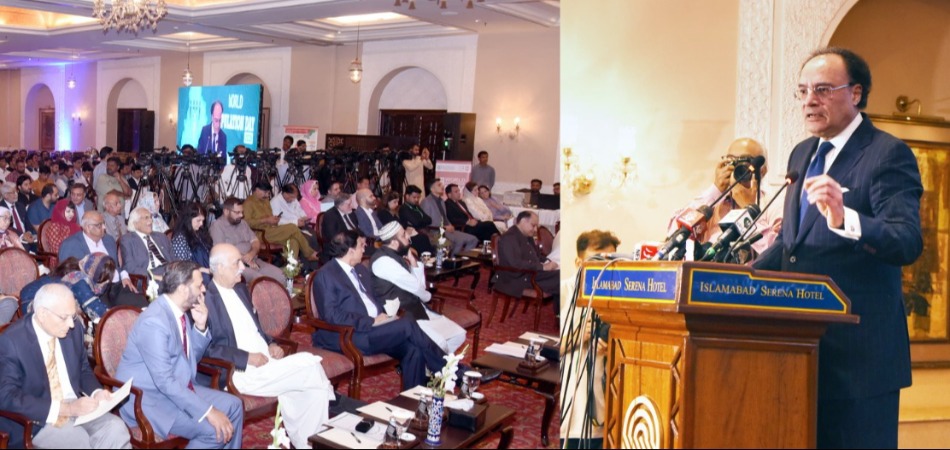IMF 2019- A bitter pill to swallow!

MG News | July 04, 2019 at 12:55 PM GMT+05:00
July 4, 2019 (MLN): The Executive Board at International Monetary Fund (IMF) has finally approved the highly anticipated $6 billion bailout package for Pakistan and expects the country to seek further financial assistance of $38 billion from its international partners to meet what IMF projects to be Pakistan’s international debt obligations over the course of the program.
Breaking up these projected payments at a press conference today, Advisor to Prime Minister on Finance said that about $8.7 billion are to be raised for repayment of project loans, $18 billion for program loan or budgetary support and around $14 billion for rollover loans.
In addition to this, an interview reported in Bloomberg has apprised that Mr. Hafeez Shaikh also said that Pakistan plans a slew of overseas bond sales in the coming months.
He told that preparations are underway for the sale of Eurobonds, Sukuk and Chinese renminbi bonds in the financial year that started this month.
Pakistan last tapped the overseas debt market in November 2017 and raised $2.5 billion. In his attempt to diversify this source of inflows in Pakistan, PM Imran Khan seems to be ready tap into the global markets now.
While the EFF supported IMF program will help Pakistan to reduce economic vulnerabilities and generate sustainable and balanced growth, the Fund has conditioned this growth to focus on a decisive fiscal consolidation, among other things.
This hints towards rising interest rates in the near future which is a tool to limit consumption and is unfortunately required to narrow down the public debt and to restrict the inflation. IMF also believes that this will build resilience and expand social spending.
Recognizing that Pakistan is currently face-to-face with economic challenges such as large fiscal and financial needs and weak and unbalanced growth, the authorities feel that a decisive fiscal consolidation is key to reducing the large public debt and building resilience, and the adoption of the FY 2020 budget is an important initial step.
Achieving the fiscal objectives will require a multi-year revenue mobilization strategy to broaden the tax base and raise tax revenue in a well-balanced and equitable manner, said Mr. David Lipton, First Deputy Managing Director and Acting Chair of the Executive Board.
Through this program, the Fund aims to restore competitiveness and rebuild official reserves with the help of a flexible, market-determined exchange rate. A flexible market-determined exchange rate and an adequately tight monetary policy will be key to correcting imbalances, rebuilding reserves, and keeping inflation low, added Mr. Lipton.
The authorities also wish to eliminate quasi-fiscal losses and encourage investment in the energy sector by depoliticizing gas and power tariff setting over the program period, gradually bringing the sector to cost recovery.
Having listed all the difficult corrective measure necessary for sustainable growth, the IMF also highlight that protecting the most vulnerable from the impact of adjustment policies will be an important priority on the program.
This will be achieved by a significant increase in resources allocated to key social assistance programs, supporting measures for the economic empowerment of women, and investment in areas where poverty is high.
While these corrective measures will unmistakably bring along a series of unwelcomed hurdles for the common man, they are necessary for the greater good of the country are in fact essential in the current scenario.
It must be emphasized over and over again that the price for deserting the economic development of a country is very high and the responsibility for it keeps accumulating until it becomes a burden to fix it.
Copyright Mettis Link News
Related News
| Name | Price/Vol | %Chg/NChg |
|---|---|---|
| KSE100 | 134,299.77 290.06M |
0.39% 517.42 |
| ALLSHR | 84,018.16 764.12M |
0.48% 402.35 |
| KSE30 | 40,814.29 132.59M |
0.33% 132.52 |
| KMI30 | 192,589.16 116.24M |
0.49% 948.28 |
| KMIALLSHR | 56,072.25 387.69M |
0.32% 180.74 |
| BKTi | 36,971.75 19.46M |
-0.05% -16.94 |
| OGTi | 28,240.28 6.19M |
0.21% 58.78 |
| Symbol | Bid/Ask | High/Low |
|---|
| Name | Last | High/Low | Chg/%Chg |
|---|---|---|---|
| BITCOIN FUTURES | 118,140.00 | 119,450.00 115,635.00 |
4270.00 3.75% |
| BRENT CRUDE | 70.63 | 70.71 68.55 |
1.99 2.90% |
| RICHARDS BAY COAL MONTHLY | 97.50 | 0.00 0.00 |
1.10 1.14% |
| ROTTERDAM COAL MONTHLY | 108.75 | 108.75 108.75 |
0.40 0.37% |
| USD RBD PALM OLEIN | 998.50 | 998.50 998.50 |
0.00 0.00% |
| CRUDE OIL - WTI | 68.75 | 68.77 66.50 |
2.18 3.27% |
| SUGAR #11 WORLD | 16.56 | 16.60 16.20 |
0.30 1.85% |
Chart of the Day
Latest News
Top 5 things to watch in this week
Pakistan Stock Movers
| Name | Last | Chg/%Chg |
|---|
| Name | Last | Chg/%Chg |
|---|




 MTB Auction
MTB Auction